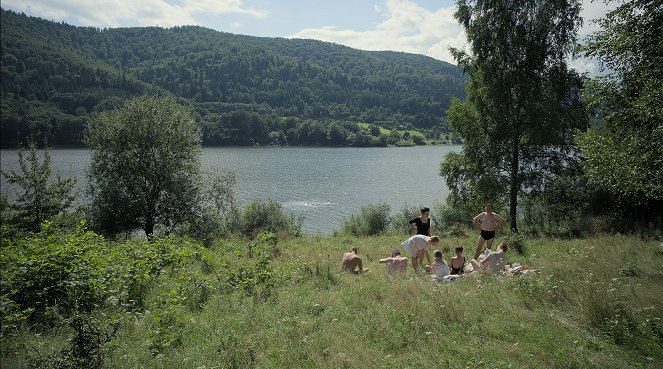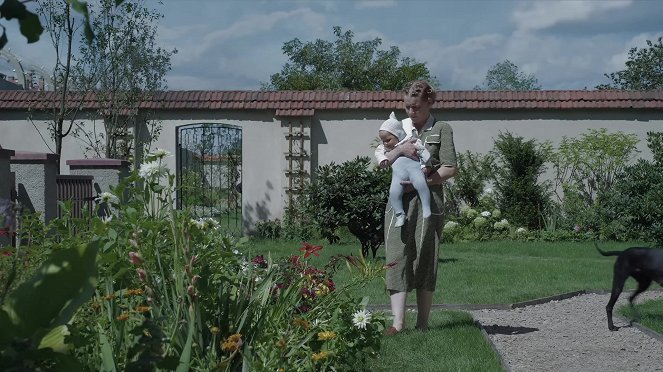Réalisation:
Jonathan GlazerScénario:
Jonathan GlazerPhotographie:
Łukasz ŻalMusique:
Mica LeviActeurs·trices:
Sandra Hüller, Christian Friedel, Ralph Herforth, Freya Kreutzkam, Max Beck, Ralf Zillmann, Imogen Kogge, Stephanie Petrowitz, Marie Rosa Tietjen (plus)VOD (2)
Résumés(1)
The commandant of Auschwitz, Rudolf Höss, and his wife Hedwig, strive to build a dream life for their family in a house and garden next to the camp. (SF Studios Fin.)
Vidéo (4)
Critiques (10)
Jonathan Glazer se révèle une fois de plus résolument auteur et artiste. On ne voit pas un seul prisonnier d’Auschwitz dans le film, ni les atrocités commises derrière les murs du camp. L’action, mise en scène de manière minimaliste mais efficace, se déroule à l’intérieur de la villa des Höss et dans leur jardin, bordé par ce mur au-dessus duquel s’élèvent les toits des baraquements du camp de concentration. Höss se rend régulièrement à son « travail » et passe son temps libre avec sa famille. La femme de Höss trouve son plaisir dans les plantes du jardin. Leurs enfants jouent près de la piscine. De temps en temps, Höss reçoit une visite pour son travail, par exemple de la part d’ingénieurs chargés d’un projet d’incinérateur plus efficace. Parfois, quelqu’un leur apporte un sac de beaux vêtements à trier... En permanence, on entend au loin le grondement des machines de l’usine de la mort, quelquefois les cris des gens, les aboiements des chiens, des coups de feu. Il y a des nuages noirs de cendres dans le ciel. La perception qu’ont les enfants Höss du monde extérieur à la maison n’est pas non plus omise, avec ses petites nuances. Les rêves nocturnes de la petite fille en images noir et blanc inversées constituent le plus impressionnant des ornements artistiques dont le film est rempli, pour la plus grande satisfaction des spectateurs du festival. La scène où Höss se trouve dans une cage d’escalier avec des couloirs sombres et vides est magistrale. Pour moi, c’est le clou du film. The Zone of Interest donne un aperçu de l’Holocauste d’une manière différente, avec la musique de générique de fin la plus désagréable que vous aurez jamais entendue. Avec ce film, Jonathan Glazer rejoint la compagnie de maîtres comme Michael Haneke et Yorgos Lanthimos. [Festival de Cannes]
()
Nous avons déjà eu maintes fois l’occasion de voir sur grand écran les horreurs qui se sont déroulées dans les camps de concentration et d’extermination. Cette fois, nous posons de manière inhabituelle un regard de l’autre côté du mur, sur la vie du commandant d’Auschwitz et de sa famille. Il s’agit d’une vie idyllique d’une perfection répugnante : une belle demeure, un magnifique jardin avec piscine, une maison remplie de domestiques… Les Höss ne manquent vraiment de rien. Ce qui se passe derrière le mur n’est dévoilé au spectateur que par de petits détails « anodins » : le jeune fils joue dans le beau jardin fleuri et derrière lui, derrière le bâtiment, on ne voit que la vapeur qui monte du train arrivant à Auschwitz ; toute la famille fête un anniversaire dans le jardin et derrière eux on peut voir l’incinérateur en pleine activité ; ils se baignent dans la rivière, et soudain flottent vers eux des cendres qui y ont été déversées… Nous savons tous très bien ce que cela veut dire, et Jonathan Glazer compte bien là-dessus. Avec une telle forme, il a réussi à créer un contraste parfaitement glaçant. En même temps, il donne à voir l’image d’une famille heureuse, ce à quoi j’ai souvent réfléchi par le passé, car j’ai toujours trouvé cela très controversé... Nous ne savons que trop bien quels monstres les membres de la SS pouvaient se révéler, mais en même temps ils ont pu être, et ont probablement même été, des pères aimants, ce qui est précisément dépeint ici de façon magnifique. Rudolf Höss est un père sympathique (sans son uniforme, il ne serait pas différent de vos amis), puis il prend le téléphone et commence à réfléchir à la manière de rationaliser la solution finale à la question juive... Il assiste à un événement social, sa femme lui demande qui était présent, et sa réponse ? « Je ne me suis pas beaucoup intéressé aux gens, j’ai réfléchi tout du long à la façon de tout gazer ici, ce serait probablement difficile d’un point de vue logistique… » Cela m’a un peu retourné l’estomac. Il m’a fallu un certain temps pour m’habituer à la manière dont le film a été tourné, cela ressemble un peu à un documentaire, et au moment du générique de fin, j’ai failli m’arracher les oreilles à cause de la « musique » qui l’accompagnait, mais au final, c'était une expérience très forte. [Festival de Cannes 2023]
()
I have a bit of a complicated relationship with director Jonathan Glazer. I like some of his films a lot, others practically not at all, and I'm glad Zone of Interest falls into the former group. I'm also happy that it ended up looking a little different than I expected. Glazer's Holocaust drama is very much built on working with sounds, but mostly with the viewers and their knowledge. You have to know what family you're looking at all the time, who Rudolf Höss was and what atrocities he committed. Zone of Interest doesn't explain anything, you could say that we learn practically nothing about the protagonists, because there's no need to, and Glazer is counting on you paying attention in history class, or at least reading the synopsis before entering the cinema. This allows him to focus solely on establishing atmosphere, combining hints of the horrors happening behind the walls of the family home while showing the ordinary little Nazi domestic bliss of the Hösses and their children. They come across as extremely ordinary, and that they are cynics and human monsters is something you have to surmise from their actions, as they balefully ignore the hell they themselves have unleashed or are willingly profiting from. Perhaps my only complaint is that I would have expected Zone of Interest to make it a little harder (like, say, the new Scorsese) and more uncomfortable for me as a viewer. On the other hand, Glazer's attempt to merely chronicle the family life of two monsters who tend a greenhouse, organize family get-togethers in the garden, and invite a loving mother to their home, only to occasionally subtly remind us who we're actually dealing with, works well too. An original and compelling drama capable of being very uncomfortable at the right moments.
()
Though throughout most of the film we don’t see anything other than an outwardly ordinary German family, the layered soundtrack, which mixes the chirping of birds and the murmur of a river with a constant mechanical drone, evokes an almost indefinable feeling from the first minutes, a feeling that something intimately familiar seems strange and oppressive. The resulting effect is best described by the term “unheimlich” from Freud’s psychoanalysis, i.e. uncanny. Zone of Interest is extremely disturbing in its ability to capture the abnormality of the everyday. ___ The unchanging, rigid apathy of the depicted world is underscored by predominantly static shots without artificial lighting and with great depth of field. The cameras are positioned in different corners of the house and garden like in a reality TV show. They record the movements of the actors without artistic stylisation, thus evoking an impression of the distant past. Not even the editing adheres to the principles of standard narrative cinema. The switching between cameras depends on which room a character has just entered. Everything thus seemingly takes place in the present tense. Subjectivity and creativity, or rather the possibility of averting one’s gaze and disrupting the order of things, are suppressed. The tasks that Höss carries out are mindless administrative work. Genocide is a logistical process. ___ If we wanted to locate the source of the tension that pervades the whole film, it would be the clash between what the Hösses are willing to see and what happens outside of their house and garden. Glazer’s distinct style is a form of rejection. He consistently avoids aestheticizing one of the greatest tragedies of modern history. At the same time, he succeeds in using empty space in a way that is far more powerful than direct depiction. Because we cannot see the other side, we are aware of what is happening there. Our effort to fill this gap leads to the fact that we cannot stop thinking about the ongoing violence. ___ Glazer also included night scenes shot with a special thermal camera. This involves a reconstruction of the story of a ninety-year-old Polish woman named Alexandra, whom Glazer met during his research. She became for him a symbol of resistance, a light in the darkness. Taking into account the perspective of those who actively resisted Nazism is one of the few elements that Zone of Interest shares with more conventional dramas about the Holocaust. Where other Oscar-winning dramas offer catharsis and a reassurance that humanity will ultimately prevail, Zone of Interest offers only a disturbing presentiment of things to come. We see that the concentration camp has become a museum where cleaners mechanically vacuum the dust and polish the display cases. A single glance inside the death factory peculiarly does not reveal any atrocities. Rather, it is characterised by the same emotionless routine that we saw in the Hösses’ bourgeois household. We have become accustomed to the presence of the Holocaust in our collective memory and in the media space. Zone of Interest shines a light on the mundanity, banality and elusiveness of the evil to which we contribute merely by remaining indifferent. 90%
()
(moins)
(plus)
Such is the daily routine of a family of ordinary, decent citizens. They grow kohlrabi and carnations in the garden, keep the house in perfect order, pet the dog and frolic in the swimming pool, and all this is provided by the head of the family, who goes to work every day in an exemplary manner and who - by the way - is the director of the most monstrous concentration camp. He is, again by the way, at work dealing with, for example, the more efficient incineration of Jews in ovens, and does it with the same emotional involvement as when you and your wife are deciding what to buy for dinner at the supermarket. And behind the walls of this middle-class family's property, behind those ominous walls, is a human-scale Mordor where the most monstrous acts against humanity are taking place, and you feel an immense oppression thanks to the ingenious sound work and the ominous visual details in the distance, such as the smoke from the ovens, or from the locomotives bringing in more and more human fuel. The film doesn't shove down your throat horrific imagery about how monstrous the Holocaust is, it does it on a subliminal basis, working with your subconscious, and that actually makes it all the worse. It made me sick, but at the same time I bow down to Jonathan Glazer for this bold cinematic experiment that says more about us humans than you'd expect.
()
Photos (13)
Photo © A24



Annonces